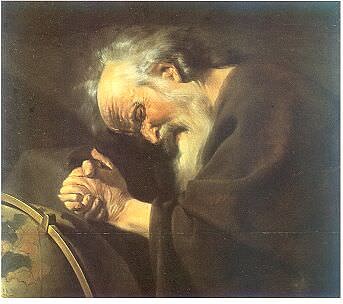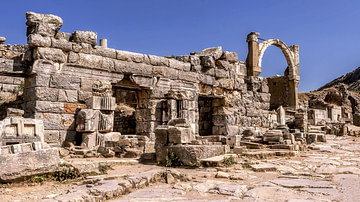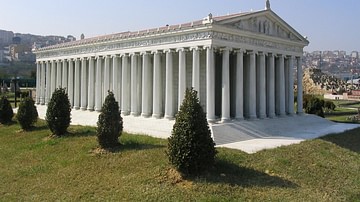
Heraclitus of Ephesus (l. c. 500 BCE) was one of the early Pre-Socratic philosophers who, like the others, sought to identify the First Cause for the creation of the world. He rejected earlier theories such as air and water and claimed that fire was the First Cause as it both created and destroyed.
Thales of Miletus (l. c. 585 BCE) claimed the First Cause was water while his student Anaximander (l. c. 610-546 BCE) concluded it was a cosmic force he called the apeiron (a boundless, infinite creative energy) and Anaximenes (l. c. 546 BCE) claimed it was air. Heraclitus rejected these suggestions in favor of fire as both a creative and transformative element. Along with the other Pre-Socratic philosophers, Heraclitus' concept would eventually influence the works of Plato (l. 428/427-348-347 BCE) and Aristotle (l. 384-322 BCE) which lay the foundation of Western philosophy.
Heraclitus was known to his contemporaries as the 'dark' philosopher, so-called because his writings were so difficult to understand. Seeming to hold the common understanding of the nature of life and the purpose of human life in contempt (as, in fact, he seems to have regarded most of the human beings he came in contact with), Heraclitus compared most people's understanding to that of those asleep. To Heraclitus, only the philosopher, the one who pursued Truth, was fully awake and fully alive, and he seemed to consider himself the only philosopher of his time.
His central claim is summed up in the phrase Panta Rhei ("life is flux") recognizing the essential, underlying essence of life as change. Nothing in life is permanent, nor can it be, because the very nature of existence is change. Change is not just a part of life in Heraclitus' view, it is life itself. All things, he claimed, are brought into and pass out of existence through a clash of opposites which continually create and destroy. He is said to have severely criticized those who lamented strife and war because both, he claimed, were instrumental in transformation.
Heraclitus is said to have died either by suicide, because he could no longer bear living among others whom he felt were his inferiors, or in an attempt to cure himself of a disease he was suffering from. Based upon what others later wrote of him, either could be true but it is generally accepted that he died while attempting to cure himself as he placed no trust in doctors nor, it seems, in anyone but himself.
Provocation & Obscurity
His writings, which so confounded the many, seem purposefully written to force a reader toward independent thought and realization (much like the zen koans of the Zen school of Buddhism) instead of providing them with more of the same sleep-inducing 'philosophies' of life Heraclitus so despised. Scorning the fairly straight forward approach of his predeccesors, such as Anaximander, Anaximenes, and Xenophanes of Colophon (l. c. 570-c.478 BCE), he consistently presented his thought as vaguely as possible with the final meaning of any statement veiled, like a riddle.
While this is generally understood as an attempt to enlighten his readers it could as easily be interpreted as simply a reflection of his individual character. As noted, it is reported by ancient writers that he brought about his own death by speaking to the doctors who were trying to treat him in this same willfully confusing manner and, by the same accounts, he spoke to everyone else in the same way. These same sources suggest he may have come from an aristocratic family in or near Ephesus and had developed a disdain for the "common people" at an early age. While this may certainly be so, it is also possible that, after enough interaction with people who did not seem to pay attention to anything more important than self-interest, he dispensed with the facade of polite society and refused to interact with others as they expected him to.
Life is Flux
Following in the traditions of the earlier Pre-Socratic philosophers, Heraclitus expounded a physical theory of matter and the physical world much along the lines of Thales, Anaximander and Anaximenes, but took the ideas further in his famous assertion that “Life is Flux” (Panta Rhei in Greek, meaning everything or all things change). If one understands that change is the only constant in life then one will more easily recognize what Heraclitus is saying in his 'obscure' writings when he claims such things as, “The way up and the way down are one and the same. Living and dead, waking and sleeping, young and old, are the same.” These things are the 'same' in that they are all subject to change, arise from one change to vanish into another and all things, constantly, are in flux and are, in that regard, the same.
Heraclitus was famous among his contemporaries for his undisguised contempt for all of them and, equally, those who preceeded them. Among the over 100 fragments we have of his work is this one which claims:
A knowledge of many things does not teach one to have intelligence; otherwise it would have taught Hesiod and Pythagoras or, again, Xenophanes and Hecataeus. (DK 22B40)
Commenting on this, Professor J.M. Robinson explains that Heraclitus is saying how these others wasted their time in speculation on many things - Hesiod with theories on the gods, Pythagoras with a preoccupation of the soul, Xenophanes in asserting there was only one god - while Heraclitus claimed one should focus only on the First Cause which would explain all else:
To know many things - to know the causes of thunder and lightning and earthquakes - is good; but it is better to understand the one thing which underlies all of these - the thought that steers all things through all things. This is wisdom. (Robinson, 88)
The underlying form of life, the `wisdom' Heraclitus understood, is that the human condition is chiefly characterized by strife, by the coming together and pulling away of opposing forces. While people lament this strife, equating it with suffering, Heraclitus observed that this same process informed the natural world as well writing, "All things come into being through opposition and all are in flux like a river" (DK 22A1). There is no reason, then, to fear or try to avoid strife because conflict is the essential underlying force in life.
Heraclitus' World Order - Logos
This contending of forces, which Heraclitus characterized as fire, is easily observable in nature and yet human beings resist the natural movement of life and try to cling to what is known and what is considered safe. Heracitus claimed that this `clinging' is unnatural and is what causes people to suffer. He writes, "This world order, the same for all, no god made or any man, but it always was and is and will be an ever-living fire, kindling by measure and going out by measure" (DK22B30). The world order is continual change and resistance to this change is a kind of death in that the individual is refusing to participate in that which defines life. Though it seems he would never admit to it, Heraclitus appears to have developed the concepts of Xenophanes concerning a single, eternal `God' who is behind all things and who set all in motion; he called this force the Logos.
In Greek, Logos means `the word' but also means `to speak' and can also refer to `conveying thought' and the Logos of Heraclitus may most neatly fit the latter meaning. The Logos constantly `conveys thought' to human beings but the message is missed because of the consistent refusal of people to recognize the natural order in their own lives. Heraclitus writes:
Though the logos is as I have said, men always fail to comprehend it, both before they hear it and when they hear it for the first time. For though all things come into being in accordance with this logos, they seem like men without experiences, though in fact they do have experience both of words and deeds such as I have set forth, distinguishing each thing in accordance with its nature and declaring what it is. But other men are as unaware of what they do when awake as they are when they are asleep. (DK 22B1)
The Logos is rational, natural, universal `thought' through which the universe came into being and by which it is maintained.
In this respect, Heraclitus' beliefs correspond with those of the younger philosopher Parmenides (l. c. 485 BCE), who claimed that all of existence was One, was of the same exact substance, and could never be created or destroyed. Heraclitus' Logos would correspond to Parmenides' One with the distinction that the Logos informs all things but is not those things themselves. Parmenides' disagreed with Heraclitus' claim that all was strife and the eternal clash of forces, insisting that all such observations were based upon false sensory interpretation. To Parmenides, there was no plurality in existence, only unity; claims to the contrary were caused by the illusions which one's senses interpreted as truth.
Heraclitus, however, would argue that Parmenides' argument was flawed in that the operation of the Logos is simply the natural order of life and an understanding of it is not dependent on the senses but on reason. He writes, "They do not comprehend how, though [the Logos] is at variance with itself, it agrees with itself. It is a harmony of opposed tensions, as in the bow and the lyre" (DK22B51) and, further, "In opposition there is agreement, between unlikes, the fairest harmony" (DK22B8) and, "The hidden harmony is stronger than the apparent" (DK22B54).
This `hidden harmony' is the basic `stuff' of existence which, when properly apprehended, makes life both sensible and meaningful. The later philosopher, Zeno of Citium (l. C. 336-c.265 BCE), would develop this idea into the school of thought known as Stoic Philosophy which would further be developed by the Stoic philosopher Epictetus (l. c. 50-c. 130 CE), among others, to become the dominant strain of philosophical thought in Rome.
Death
Diogenis Laertius (l. c. 180-240 CE), in the 8th book of his famous Lives and Opinions of Eminent Philosophers relates the death of Heraclitus and how it was in keeping with his life:
When somebody asked Heraclitus to decree some rules, he showed no interest because the government of the city was already bad. Instead, he went to the temple of Artemis and played dice with children. Finally he became misanthrope, withdrew from the world and lived in the mountains feeding on grasses and plants. However, having fallen in this way into dropsy he came down to town and asked the doctors in a riddle if they could make a drought out of rainy weather. When they did not understand he buried himself in a cow-stall, expecting that the dropsy would be evaporated by the heat of the manure; but even so he failed to effect anything, and ended his life at the age of sixty.
The `dropsy' Heraclitus suffered from would, today, be known as `edema' a swelling of soft tissue due to an accumulation of fluid beneath the skin. It was typical of Heraclitus to pose his problem to the doctors in a riddle as it seemed he was always testing others in the belief that he possessed above-average intelligence. When they failed to understand his request that they `make a drought out of rainy weather' to mean he was suffering from dropsy, he, also typically, decided he knew best how to cure himself.
Scholars place his death at about 475 BCE. Besides the Stoic school, Heraclitus' thought would greatly influence others who came after him and his riddles are often quoted and alluded to in Plato's Dialogues and, later, in the works of Aristotle. Heraclitus was consistently cited as among the most brilliant, if difficult, of the Pre-Socratic philosophers by later ancient writers who recognized his importance in synthesizing the human experience with the natural world and he continues to be understood in this same way in the modern era.
Note: The `DK' citations refer to the Diels-Krantz catalogue of Fragments of the Pre-Socratic Philosophers as used in Kathleen Freeman's Ancilla to the Pre-Socratic Philosophers.





